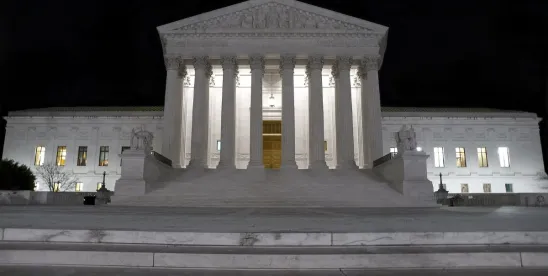With a significant mass of cases left to decide and only a few weeks to issue the opinions, the U.S. Supreme Court has reduced the backlog by four today. None of them, however, resolves the future of Chevron deference or the criminal prosecution vulnerability of the former president.
Instead, the Court has given us opinions concerning retaliatory or selective arrest, malicious prosecution, and the permissible scope of expert opinion concerning the mental state of drug smugglers—all important issues in criminal jurisprudence. The Court also decided a case of importance, if only to those who earn income from American-controlled foreign businesses and those who advise them. The lineups of Justices deciding these cases also might be of interest, particularly, as we have discussed in the past, finding Justice Kavanaugh and Justice Kagan in accord.
The retaliatory arrest case is Gonzales v. Trevino, and in a per curiam opinion, all the Justices agreed that the U.S. Court of Appeals for the Fifth Circuit had misapplied the holding of Nieves v. Bartlett, 587 U. S. 391, 402 (2019), in which the Supreme Court had held that, as a general rule, a plaintiff bringing a retaliatory-arrest claim “must plead and prove the absence of probable cause for the arrest.” A narrow exception to that rule applies in cases where there might have been probable cause, but an arrestee can produce “objective evidence that he was arrested when otherwise similarly situated individuals not engaged in the same sort of protected speech had not been.” Sylvia Gonzales was a city councilwoman in a small Texas town, the mayor of which orchestrated an investigation that led to Gonzalez’s arrest on charges that she had unlawfully removed a governmental record. The case against her was summarily dismissed by the local district attorney, and Gonzales sued the mayor under 42 U. S. C. §1983, claiming that the arrest was engineered in retaliation for her having sought the mayor’s removal. She supported her claim with research that showed that, for over a decade, the anti-tampering statute under which she had been charged had been applied hundreds of times to cases that involved using or making fake government identification documents but had never been applied “to criminally charge someone for trying to steal a nonbinding or expressive document.” While Gonzales conceded that there had been probable cause for her arrest, she argued that the exception set forth in the Nieves case applied. Rejecting that position, the Fifth Circuit held that the retaliatory arrest exception applied only if a plaintiff proffered “comparative evidence” of “otherwise similarly situated individuals who engaged in the same criminal conduct but were not arrested.” A unanimous Supreme Court disagreed, holding that the Fifth Circuit had taken an overly cramped view of Nieves.
Thus, the Supreme Court held that the demand for virtually identical comparators goes too far. Since the Nieves exception accounts for “circumstances where officers have probable cause to make arrests, but typically exercise their discretion not to do so,” a plaintiff seeking to fall within the exception only must produce objective evidence to prove that her arrest occurred in such circumstances. Gonzales met that burden of production, and the Court, therefore, remanded her case for a determination as to whether what she produced was sufficient to satisfy the Nieves exception. Gonzales also argued that the Nieves no-probable-cause rule applied only to cases involving split-second arrests rather than deliberative ones. The Court, having ruled for Gonzales as to comparator evidence, declined to reach the second question.
It is not a great distance from retaliatory prosecution to malicious prosecution. And so, the road leads us from Gonzalez v. Trevino to Chiaverini v. City of Napoleon, where a divided Court held that the presence of probable cause for one charge in a criminal proceeding does not automatically defeat a Fourth Amendment malicious prosecution as to another, baseless charge. That point was raised in yet another case brought under 42 U. S. C. §1983, this time by a jewelry store owner who had been charged with three criminal charges that were later dropped. Chiaverini then sued, claiming that his arrest and detention violated the Fourth Amendment. To prevail on this claim, he had to show that the officers brought criminal charges against him without probable cause, leading to an unreasonable seizure of his person. The U.S. District Court for the Northern District of Ohio and the Sixth Circuit held against him. In granting summary judgment, however, those courts focused on the fact that there was probable cause to arrest him with respect to two misdemeanors, which they believed was sufficient to obviate the charge of malicious prosecution. However, that conclusion did not address whether the officers had probable cause to bring a felony money-laundering charge. Although the parties and the United States, as amicus, had different views of how a plaintiff’s burden is met when an invalid charge accompanies a valid one, they were in agreement as to the conclusion that a valid charge does not categorically defeat a malicious prosecution claim with respect to an adjacent invalid charge. While the parties and the Court’s majority, led by Justice Kagan, held this view, which required a remand to deal with the consequences of the false charge, Justices Thomas, Alito, and Gorsuch dissented, arguing that a Section 1983 claim should not be allowed to vindicate a Fourth Amendment constitutional right.
In the day’s third criminal case, Diaz v. United States, a 6–3 Court, per Justice Thomas, dealt with the question of whether a Department of Homeland Security expert’s testimony that drug traffickers generally do not entrust large quantities of drugs to people who are unaware they are transporting them ran afoul of the provision of Federal Rule of Evidence 704(b), which provides that “[i]n a criminal case, an expert witness must not state an opinion about whether the defendant did or did not have a mental state or condition that constitutes an element of the crime charged or of a defense.” This testimony was offered to counter a drug mule’s testimony that she didn’t “knowingly” transport drugs that were hidden in her car. The Court’s majority ruled that expert testimony that “most people” in a group have a particular mental state is not an opinion about “the defendant” and thus does not violate Rule 704(b). Interestingly, Justice Jackson concurred with Justice Thomas’s majority opinion, as did the other court conservatives, save for Justice Gorsuch, who dissented, with Justices Sotomayor and Kagan joining him. One suggests, as has been suggested in this blog in the past, that Justice Gorsuch often channels the late Justice Scalia in staking out “liberal” positions in individual rights criminal cases.
Finally for the day, a mixed bag of Justices rendered opinions in Moore v. United States. Justice Kavanaugh, writing for himself, the Chief Justice and Justices Sotomayor, Kagan, and Jackson, with Justices Barrett and Alito separately concurring, held for the Court that a provision of the Internal Revenue Code known as the Mandatory Repatriation Tax (MRT) which attributes the realized and undistributed income of an American-controlled foreign corporation to the entity’s American shareholders, and then taxes the American shareholders on their portions of that income, does not exceed Congress’s constitutional authority under Article I, §§8 and 9 and the Sixteenth Amendment. Spilling a great deal of ink, Justice Kavanaugh traces a long-standing chain of precedents to reach that conclusion, from which Justices Thomas and Gorsuch dissented. The holding is strictly limited to entities treated as pass-throughs, i.e., American-controlled foreign corporations whose American shareholders ordinarily are not taxed on the income of those corporations except when the corporation pays a dividend or when the shareholder sells shares. The argument concerned whether the MRT is a tax on income and, thus, need not be apportioned. The Moores argued that the tax was one on property and, therefore, was unconstitutional because it was not apportioned. The Court sided with the government in holding that, when dealing with an entity’s undistributed income, Congress may either tax the entity or tax its shareholders or partners. Whichever method Congress chooses, the tax remains a tax on income.
That’s it for today, but more decisions will be coming soonest. Will Justice Kagan and Kavanaugh, often recently in accord, lead a liberal-conservative majority in upholding, though likely limiting, Chevron? And will they be together in ruling against Donald Trump’s claim of blanket immunity from criminal prosecution? Time, though not much of it, will tell. Stay tuned.




 />i
/>i

